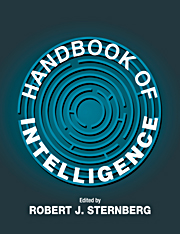Book contents
- Frontmatter
- Contents
- Preface
- Contributors
- PART I THE NATURE OF INTELLIGENCE AND ITS MEASUREMENT
- PART II DEVELOPMENT OF INTELLIGENCE
- PART III GROUP ANALYSES OF INTELLIGENCE
- PART IV BIOLOGY OF INTELLIGENCE
- PART V INTELLIGENCE AND INFORMATION PROCESSING
- PART VI KINDS OF INTELLIGENCE
- PART VII TESTING AND TEACHING INTELLIGENCE
- PART VIII INTELLIGENCE, SOCIETY, AND CULTURE
- 23 Intelligence and Education
- 24 Intelligence and Public Policy
- 25 Intelligence and Culture
- PART IX INTELLIGENCE IN RELATION TO ALLIED CONSTRUCTS
- Author Index
- Subject Index
25 - Intelligence and Culture
Published online by Cambridge University Press: 05 June 2012
- Frontmatter
- Contents
- Preface
- Contributors
- PART I THE NATURE OF INTELLIGENCE AND ITS MEASUREMENT
- PART II DEVELOPMENT OF INTELLIGENCE
- PART III GROUP ANALYSES OF INTELLIGENCE
- PART IV BIOLOGY OF INTELLIGENCE
- PART V INTELLIGENCE AND INFORMATION PROCESSING
- PART VI KINDS OF INTELLIGENCE
- PART VII TESTING AND TEACHING INTELLIGENCE
- PART VIII INTELLIGENCE, SOCIETY, AND CULTURE
- 23 Intelligence and Education
- 24 Intelligence and Public Policy
- 25 Intelligence and Culture
- PART IX INTELLIGENCE IN RELATION TO ALLIED CONSTRUCTS
- Author Index
- Subject Index
Summary
A distinctive characteristic of the human species is that we live in societies that create their own niche within the larger ecosystem, imposing structure on the natural environment by means of a technology that is accumulated over many generations through the process known as culture. Culture consists of a set of practices (constituted by a particular pattern of recurrent activities with associated artifacts) that are informed by a system of meanings (encoded in language and other symbols) and maintained by a set of institutions over time. The history of the gradual change of these practices is part of the system of meanings shared by the members and owners of the culture as a function of their transformative participation in the culture's practices.
The relations between intelligence and culture have been considered from three somewhat different perspectives that can be summarized under the metaphors of culture as a language, culture as a womb, and culture as a forum (Serpell, 1994). According to the language metaphor, each human culture constitutes a distinctive system of meanings for representing the mind, within which the concept of intelligence is defined. I shall illustrate this approach in the section on the cultural conceptualization of intelligence. According to the womb metaphor, different human cultures generate different kinds of nurturant environment for the growth of a person mold the development of the individual's intelligence in different ways. I shall review some of the research evidence that supports this view in the section on theories of cognitive development.
Information
- Type
- Chapter
- Information
- Handbook of Intelligence , pp. 549 - 578Publisher: Cambridge University PressPrint publication year: 2000
Accessibility standard: Unknown
Why this information is here
This section outlines the accessibility features of this content - including support for screen readers, full keyboard navigation and high-contrast display options. This may not be relevant for you.Accessibility Information
- 48
- Cited by
